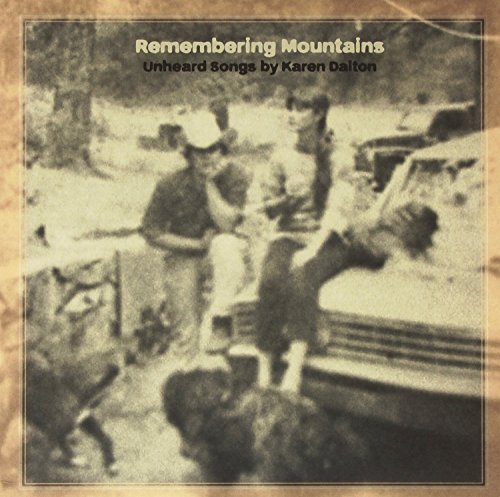
Various Artists
Remembering Mountains: Unheard Songs By Karen Dalton
Release Date: May 26, 2015
Genre(s): Folk, Pop/Rock
Record label: Tompkins Square
Music Critic Score
How the Music Critic Score works
Buy Remembering Mountains: Unheard Songs By Karen Dalton from Amazon
Album Review: Remembering Mountains: Unheard Songs By Karen Dalton by Various Artists
Excellent, Based on 8 Critics
Based on rating 9/10
Like so many artists little known in their own time, Karen Dalton has posthumously become sort of a cottage industry of influence on contemporary musicians, all of this despite the fact she only released two albums proper during her lifetime, It’s So Hard to Tell Who’s Going to Love You The Best on Capitol in 1969 and In My Own Time on Paramount in 1971, neither of which contained any of her original compositions. It wasn’t until the new millennium her influence was widely heralded across the spectrum of more folk-inclined musicians. Following the reissue of each in the mid-‘00s, her long out-of-print albums became accessible to a broader, more receptive audience.
Based on rating 4/5
Though she died from alcohol-related disease in 1993, Karen Dalton is more famous now than she was during the early folk boom when Fred Neil and Bob Dylan sang her praises. The girl from Enid, Oklahoma, only completed two albums in her own lifetime, neither of which contained original material. Now, thanks to friend Peter Walker, 11 female singer-songwriters eager to maintain Dalton’s reputation have interpreted compositions from files and diaries, with Lucinda Williams and Josephine Foster offering different treatments of the typically pain-filled Met An Old Friend.
Based on rating 7.8/10
Karen Dalton is one of the tragic ciphers, an Oklahoma-born folksinger who played a long-neck banjo and a 12-string guitar and sang weary, welling songs about bad and broken loves. For decades, late-arriving fans were told she died of AIDS, penniless and displaced, curled up on a New York City street corner. That particular bit of apocrypha has since been debunked (she was in the care of her friend, the guitarist Peter Walker, when she passed away in 1993), but it pervades her memory anyhow: Karen Dalton, lost soul.
Opinion: Exceptionally Good
Folk singer Karen Dalton released only two studio albums in her time before descending into lifelong addiction and dying homeless in New York City, but those recordings proved enough to nurture an obsessive fan base and bowl over a generation of interpreters. "Real beauty rarely glitters, so I find," Patty Griffin sings on "All That Shines Is Not Truth," with words written by Dalton and presented on the new collection "Remembering Mountains: Unheard Songs by Karen Dalton." This is a modal window. The same could be said of Dalton herself.
Opinion: Excellent
The idea of contemporary musicians adding music to long-lost lyrics is hardly a brand new one. Most famously, Wilco and Billy Bragg teamed up to provide melodies to a freshly unearthed verses by US folk figurehead Woody Guthrie on two Mermaid Avenue records in 1998 and 2000. Most recently, a selection of songwriters including My Morning Jacket’s Jim James and Elvis Costello tackled unused lyrics by Basement Tapes-era Bob Dylan.
Opinion: Excellent
Posthumously unearthing and arranging unrecorded lyrics by late great musicians may not be the most frequent tribute album path but neither is it rare or indeed fruitless phenomenon. Certainly Billy Bragg & Wilco’s enjoyable Mermaid Avenue project in the late-‘90s/early-‘00s, to breathe life into unheard Woody Guthrie songs, is a shining example of when it can work brilliantly. More recent multi-headed interpretations – by the likes of Nick Cave, Iggy Pop and Thurston Moore – of excavated wares from The Gun Club’s Jeffrey Lee Pierce, across three albums on Glitterhouse, provided few embarrassments either.
Opinion: Excellent
Mbongwana Star FROM KINSHASA. Mbongwana Star, a band from the Democratic Republic of the Congo, radically upends expectations of Congolese music; “mbongwana” means “change” in Lingala, a Congolese lingua franca. Its album “From Kinshasa” (World Circuit/Nonesuch) is a world away from the ….
Opinion: Excellent
Karen Dalton was a classic tragic figure. A Midwestern transplant to the Greenwich Village folk scene of the 60s, she was beloved of her more famous friends (Bob Dylan, Tim Hardin, Peter Stempfel), but largely unknown outside of their circle. She played banjo and 12-string guitar and sang with the sort of textured, croaky voice that there is only room for one of in a generation.
'Remembering Mountains: Unheard Songs By Karen Dalton'
is available now

